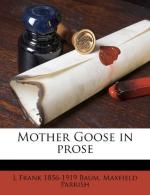He did not walk about, being lazy and preferring his ease; but he lived in a little cottage with one room, where the people came to consult him in regard to all their troubles.
They had named him Sophocles, and when anything went wrong they would say,
“Let us go and consult Sophocles, for he is very wise and will tell us what to do.”
Thus one man, who had sued his neighbor in the courts, became worried over the outcome of the matter and came to consult the wise man.
“Tell me, O Sophocles!” he said, as he dropped a piece of money upon a plate, “shall I win my lawsuit or not?”
Sophocles appeared to ponder for a moment, and then he looked at his questioner with his one eye and replied,
“If it is not decided against you, you will certainly win your suit.”
And the man was content, and went away feeling that his money had been well invested.
At another time the mother of a pair of baby twins came to him in great trouble.
“O most wise Sophocles!” she said, “I am in despair! For my little twin girls are just alike, and I have lost the ribbon that I placed on one that I might be able to tell them apart. Therefore I cannot determine which is Amelia and which is Ophelia, and as the priest has christened them by their proper names it would be a sin to call them wrongly.”
“Cannot the priest tell?” asked the wise man.
“No one can tell,” answered the woman; “neither the priest nor their father nor myself, for they are just alike. And they are yet too young to remember their own names. Therefore your great wisdom is our only resource.”
“Bring them to me,” commanded Sophocles.
And when they were brought he looked at them attentively and said,
“This is Ophelia and this Amelia. Now tie a red ribbon about Ophelia’s wrist and put a blue ribbon on Amelia, and so long as they wear them you will not be troubled to tell them apart.”
Everyone marvelled greatly that Sophocles should know the children better than their own mother, but he said to himself,
“Since no no [both nos in original] one can prove that I am wrong I am sure to be right;” and thus he maintained his reputation for wisdom.
In a little side street near the center of Gotham lived an old woman named Deborah Smith. Her home was a wretched little hut, for she was poor, and supported herself and her husband by begging in the streets. Her husband was a lazy, short, fat old man, who lay upon a ragged blanket in the hut all day and refused to work.
“One beggar in the family is enough,” he used to grumble, when his wife upbraided him, “and I am really too tired to work. So let me alone, my Deborah, as I am about to take another nap.”
Nothing she could say would arouse him to action, and she finally allowed him to do as he pleased.
But one day she met Socrates walking in the street, and after watching him for a time made up her mind he was nothing more than a fool. Other people certainly thought him wise, but she was a shrewd old woman, and could see well enough that he merely looked wise. The next day she went to the south of the city to beg, and there she heard of Sophocles. When the people repeated his wise sayings she thought:




